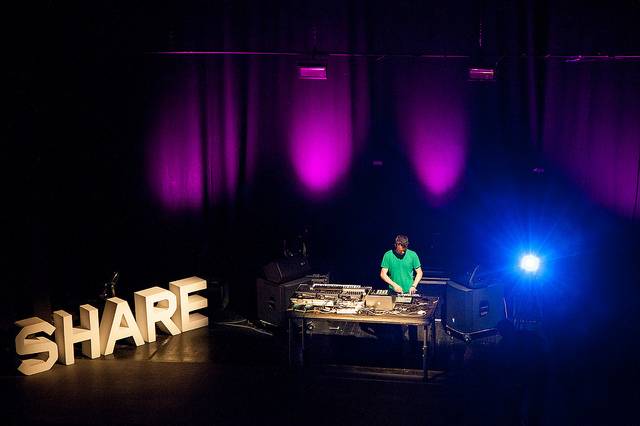SHARE Beirut: Internet. Activism. Music. Culture.

When talking about revolutions today and the roots of citizen uprisings, it is not often that we associate those roots with a party. But the uprisings against Slobodan Milosevic, the former authoritarian president of Serbia, in 2000 may be partly traced back to a party that grew out of proportion on a university campus in Novi Sad, Serbia. It started out as a music festival in a political current that suppressed independent voices under an authoritarian regime so tightly wound up as well as oblivious to this “secret” new means of proliferation amongst the youth. As authorities looked on the crowd of music festers, they seemed to be content that they were partying and “staying out of politics,” as Rajko Bozic, one of the original organizers of the music festival points out. So they left them alone, unaware of the political campaign that was taking place within. This is how the Exit Festival became the first music festival that grew out of a student protest, effectively forging a symbiotic relationship between music and political activism. Students mobilized following the festival and created a huge “Get out the Vote” campaign just before the 2000 elections. Ultimately, Bozic confirms, “We overthrew the man.”
Almost 10 years later, the Creative Director of the original Exit Festival, Vladan Joler, currently a faculty member of New Media at the Art Academie of Nord Novi Sad, wanted to start something new that was rooted in the same key elements of the Exit Festival: activism and music, but with the added theme of the Internet – as an “open, decentralized and accessible form of communication, exchange, and creation” with an educational edge for youth. The need in Serbia at the time was a platform where local and international youth could share their talent and meet. In 2010, the first SHARE Conference was hosted by a team led by Joler in Belgrade, inviting stars in music, technology, and activism from all around the world. In its third year, it is the first time SHARE leaves the borders of Serbia, to Beirut.
Why Beirut? “We are similar in mentality: role of the family, politics, socially, and we are also bad drivers,” Bozic says with a grin, “But we are not as hard working as the Lebanese.” Gasp! “Anyway, it seemed natural and obvious.” He further explained the added similarity of Beirut’s need for “a platform” to share talent and feed its activist energies. Joler adds, “To make some kind of injection of positive energy and creative ideas related to the Internet and activism and to establish a network of like-minded people,” Joler says. “We found Beirut to be a special place because of its Internet [blogging] culture and underground scene.”
The conference this weekend launches on Friday, October 5 with a few special choices including the Chaos Maker Party at Karaj Beirut where “robots, experimental photography, tools, and tea” will be provided; or Independent Arab Film Night on the St. Nicolas Stairs in Gemmayze. There are also DJ performances by Jade or Fari Bradley. The weekend will ensue with talks at Solea V (Jisr el Wati next to Jaguar Dealership) by activists, social media experts, interactive performers, and more from all over the planet: Cuba, Zimbabwe, Tunisia, Iceland and across Europe, the U.S., Canada, and of course homegrown. Electronic music heats up various pubs and clubs throughout the weekend evenings through Sunday, October 7.
While Bozic especially recommends the WetRobots <3 Bosaina, a musical outfit from Cairo as well as entrepreneur and blogger Esraa Haidar Zayoun, also rocking Beirut in unique appearances will be New York based DJ Fatima Qadiri, interactive artist and engineer Ayah Bdeir, Cuban writer and filmmaker Abigail H. Tar, and others from the extensive list of local and international talent. For more information about SHARE, check out the website here.
This weekend SHARE brings Beirut one long music-filled, educational, activist-inducing, and technologically-chocked party.




